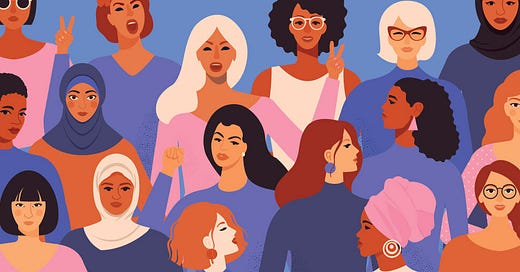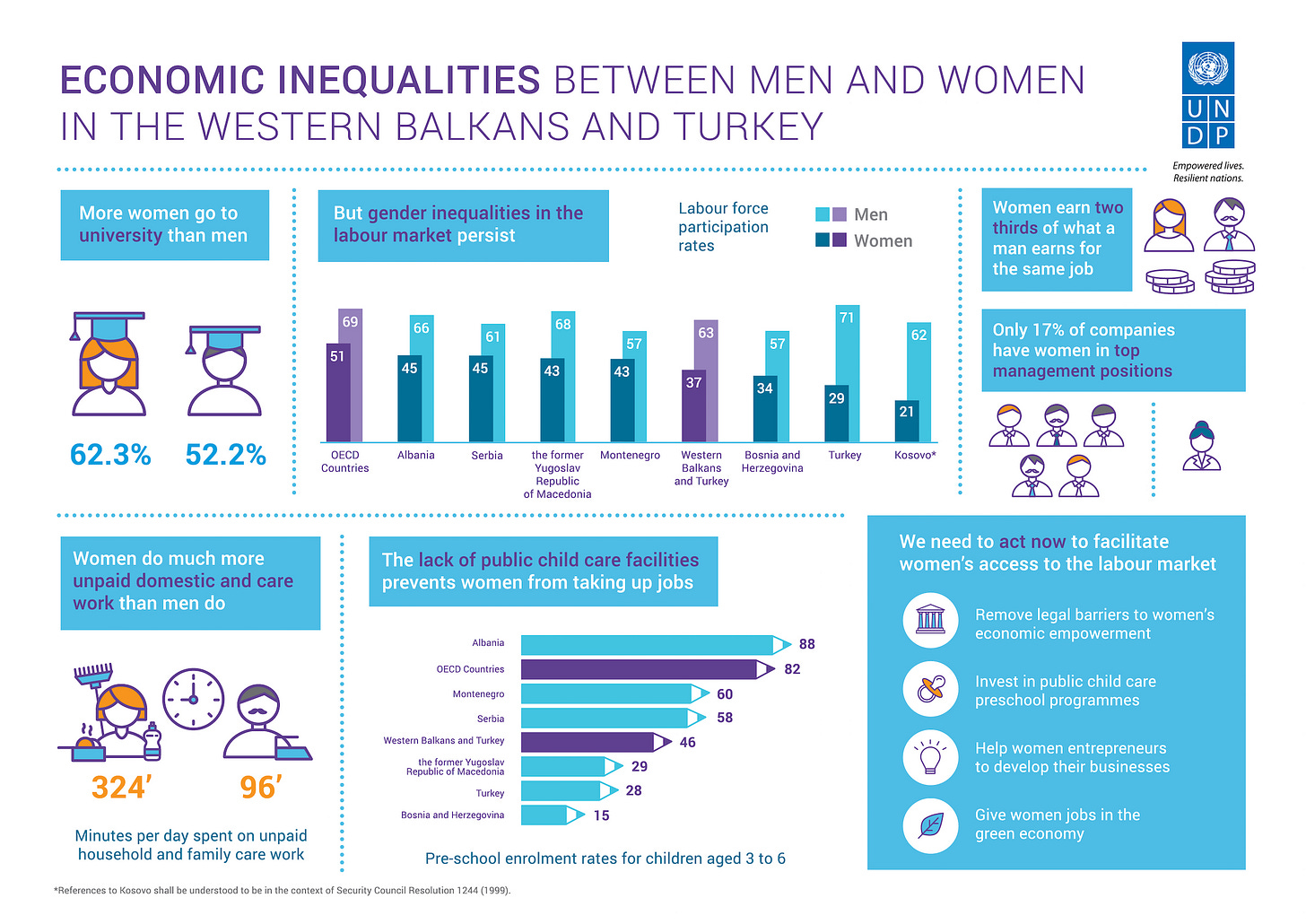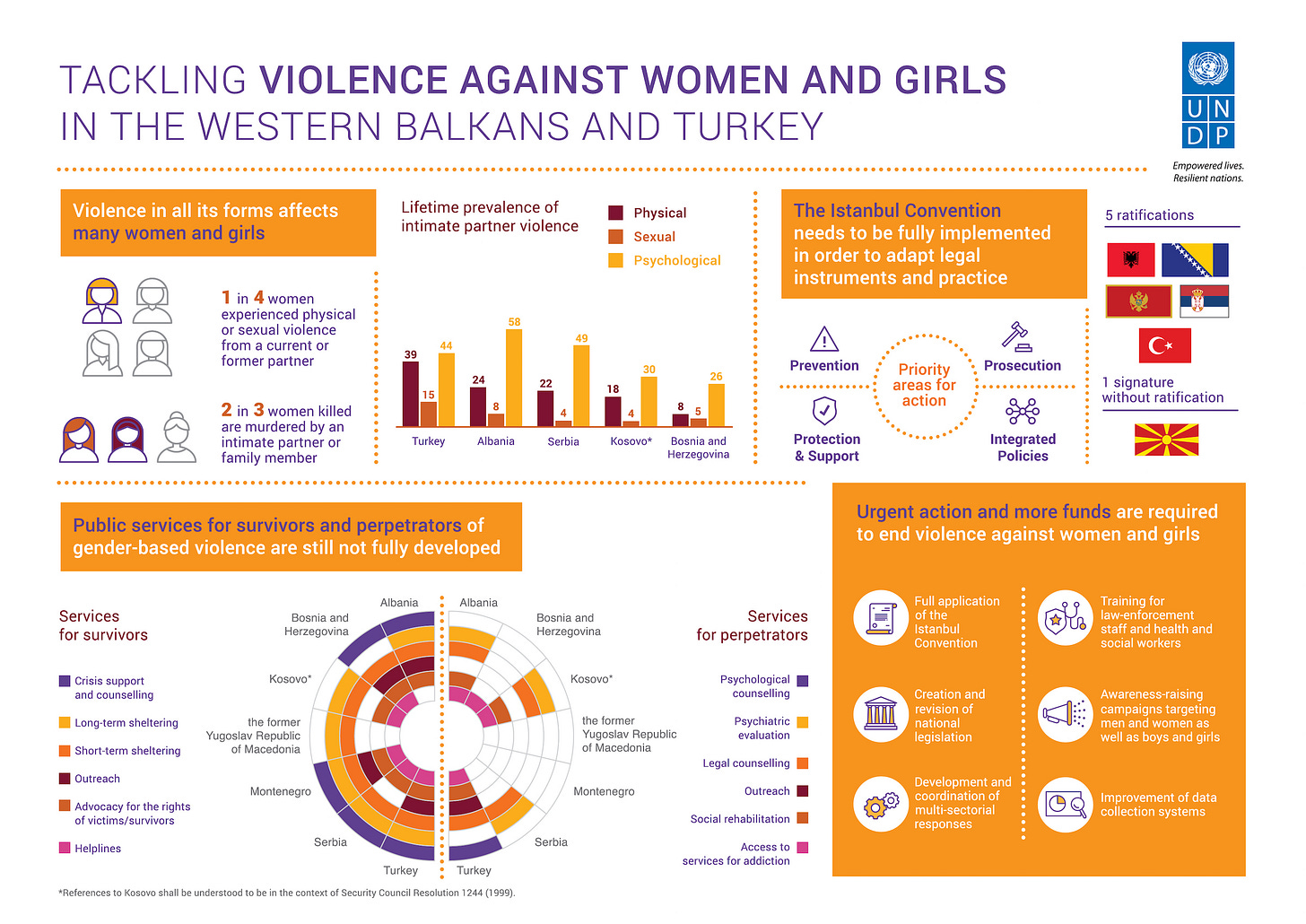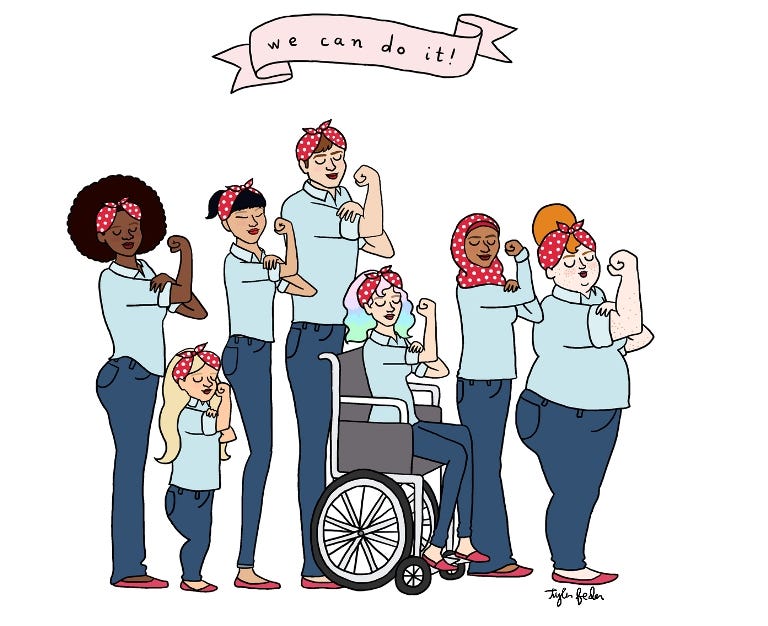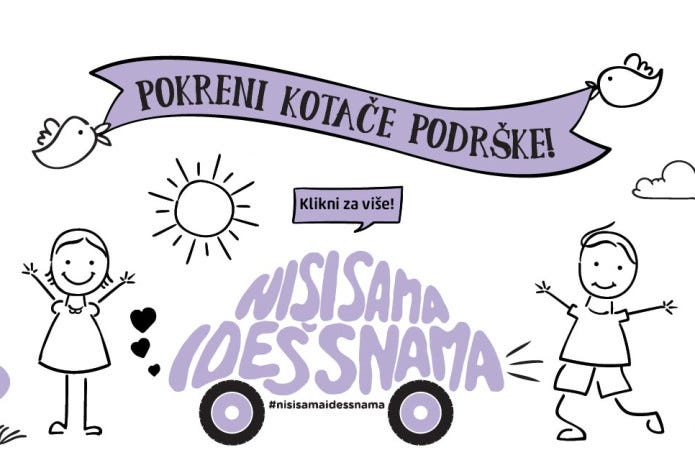XXXVII. Every day is March 8th
Focus on gender-based violence and (in)equality in the Balkans, waiting for the International Women's Rights Day. Sara Latorre tells us about feminist activism in the region
Hi,
welcome back to BarBalkans, the Italian newsletter whose aim is to give a voice to the Western Balkans’ stories, on the 30th anniversary of the Yugoslav Wars.
It is two days before the International Women’s Day.
Like every 8 March, like every day, we take a stand to reaffirm that there will be no freedom until we all have equal opportunities an rights.
Until we recognize and resolve the economic, political, social and cultural inequalities between men and women.
Until we eliminate gender discrimination and we all condemn domestic and public violence against women.
Until we achieve gender equality.
In the Western Balkans and everywhere in the world.
A brief overview
Today we will address the issue of gender equality in the Western Balkans.
First of all, we have to consider the economic inequalities, because they affect everyone’s everyday life.
From self-realization to economic independence, from time-management to social justice.
Given that more girls (62%) than boys (52%) undertake bachelor’s degree studies (UNPD, 2017), two negative factors have to be pointed out.
Firstly, in the Western Balkans, a woman earn two thirds of a man’s salary for the same job: for a 1,500 euros per month job, a female worker receives only 1,000 euros.
Secondly, less than 1 company out of 5 has women in top management positions.
There is also a major problem of labour market participation: the male labour force participation rate is more than 57 percent in all the countries, while the female rate is everywhere less than 1 worker out of 2 women (45% in Albania and Serbia).
From a socio-cultural point of view, one of the more obvious causes is linked to the traditionalist and patriarchal vision of the family: the wife/woman as “the angel in the house”.
In one day, a Balkan man spends just an hour and a half on unpaid domestic and care work. An hour and a half out of twenty-four.
Meanwhile, a Balkan woman spends about five and a half hours per day on unpaid domestic and care work. Almost four times longer than her partner.
As a wife and a mother, a woman is expected to give up her job to look after her children. In the region, less than 1 child out of 2 attends kindergarten (46%), while the average for OECD countries is 82%.
When it comes to gender discrimination in the Western Balkans, there is also another worrying aspect to be considered.
We are talking about the cultural background that legitimizes men to commit violence of all kinds against wives, girlfriends, daughters or sisters. This normalization of violence is also referred to as “rape culture".
According to UNDP data, 1 woman out of 4 experienced physical or sexual violence from a current or former partner.
Considering femicides, 2 women out of 3 were killed not by strangers, but by intimate partners or family members.
The Istanbul Convention (the Council of Europe Convention on preventing and combating violence against women and domestic violence, 2011) needs to be fully implemented in the region.
Since 2018, it has entered into force in almost all Balkan countries (the process of ratification has just begun in Kosovo), but there are still many priority areas for action to be developed: from prevention to victim support, up to prosecution.
In Bosnia and Herzegovina there is a lack of long-term sheltering, in Serbia a low level of outreach and in Kosovo no crisis support and counseling, while in North Macedonia there is also a lack of helplines.
The services for perpetrators of crimes (to solve the problem at the source) are almost totally absent. Partial exceptions are present in Serbia, with legal counseling and psychiatric evaluation services, Albania and Kosovo with social rehabilitation and access to services for addiction.
This is the theoretical framework. Now it is time for me to take a step back and make space to someone dealing with these issues on a daily basis, on March 8th as well as on every other day of the year.
Sara Latorre, who is very familiar with feminist activism in the Western Balkans, has just entered the BarBalkans.
Sara, you have the floor!
Ajdemo!
Hi everyone!
First of all, I thank Federico Baccini aka BarBalkans for inviting me to talk about this topic.
I would like to specify that I am not an expert. I am interested in feminism in general and in feminism in the Balkans in particular, that’s all.
I do not want to justify any inaccuracies (I invite you to point them out, if necessary). On the contrary, I want to highlight two things.
First, I believe it is unfair to define yourself an expert in dynamics and territories that you have not experienced personally, even if you have a great passion for them. Second, in my opinion, feminism is not something that you study once and for all. It is a method that has to be learnt and applied, with patience.
When we talk about the Balkans, we usually think of socialist Yugoslavia and the wars following its disintegration.
Western people rarely inform themselves about the socio-political situation of the current Balkan countries, or get an idea that goes beyond false but deeply rooted stereotypes.
If we want to think in a feminist way, it must be clear to us that a toxic narrative towards a specific category is doubly deleterious for women who are part of it.
All, ALL women suffer from gender discrimination.
In addition, some of them have to deal also with the discrimination against their ethnic/social/genetic group: Roma women are discriminated as both women and Roma, poor women as both women and poor, women with disabilities as both women and people with disabilities, and so on.
Balkan women are discriminated as both women and people who live in economically weak countries, politically at the mercy of nationalisms (which are always sexist and macho), culturally idealized (damn Orientalism) and internationally mocked and pitied.
As you can see, disparities and uneasinesses intersect within people’s lives. This is why we have to understand that feminism is intersectional.
One of the cornerstones of intersectional feminism is the allyship with discriminated groups. This is not done by just simply talking about them - that risks to turn into a narcissistic talking on their behalf - but it means leaving room for people directly involved to lead their narrative.
In this way, I have decided to use my linguistic competence (that gives me the ability to read and listen to Serbo-Croatian), to let you discover how courageous and politically involved Balkan women are in the daily struggle against gender-based discrimination.
Ajdemo!
Gender stereotypes have very concrete consequences on everyone’s everyday life (not just women’s).
Since common beliefs are based on abstract prejudices, the funny thing is that they are not based on facts - which would prove their groundlessness - but on a certain type of narrative.
And what is the medium that creates that narrative and shapes public opinion? The press.
The press in the Balkans is not feminist (as it is not in the Western world, so let’s refrain from judging) and the most striking example is represented by Serbia.
In a country that has 7 million inhabitants and 27 femicides only in 2020 (an approximate calculation of the cases registered by women’s refuge centers, since the State does not bother to collect data), the main newspapers report femicides as if they were entertainment splatter scenes, with no respect for the victims and no condemnation of the perpetrators of crimes.
In order to fill this - deliberate - information vacuum, the association Novinarke protiv nasilja (Journalists against Violence) was created.
The group is not only engaged in counter-information (providing real data on violence against women in Serbia), but also in raising awareness about the online attacks against 73% of female journalists, just because they are women advocating for women’s rights.
Thanks to Novinarke protiv nasilja we know that 45% of Serbian media use sexist sentences (the importance of narration, we said) and that femicides are treated by 98% of Serbian media like single criminal cases without taking into consideration the common cultural substrate.
One of the most famous members of Novinarke protiv nasilja is Iva Parađanin. Journalist for Elle Serbia (a magazine surprisingly “on point” about gender equality, as well as Vice Serbia), Parađanin is the author and host of the podcast Tampon zona, whose second season is produced by Elle Serbia.
Within the episodes (from 30 to 60 minutes long), the journalist talks about issues totally ignored by mainstream media with a guest, creating a safe and free space to explore many different topics. For example, the role of institutions in sexual violence, public breastfeeding, assaults on lesbian women, women’s internet rights, toxic relationships and many more.
I have already said that Tampon area communication is safe and free.
It is true that feminism training never ends, but we have to start somewhere.
You cannot expect that a person raised all their life in a patriarchal environment can find Simone de Beauvoir’s grace on the Damascus road.
And I have to add that a communication aimed only at people who use social media, know English and have a certain level of education is not really feminist.
Feminist education must be offered to everyone precisely because patriarchy harms everyone. For this reason, it has to adapt to the skills and the background of the different audience.
In former Yugoslavia’s countries there are several collectives working on gender equality’s education.
For example, the Centar za ženske studije in Zagreb has been organizing feminism courses since 1995 and has a well-stocked library.
This center wants to promote a gender-based training using a pedagogical approach, “which deviates from neoliberal competitiveness” and aims to reach a transversal and “regional” audience (from all the Balkans, not only Croatia).
Some lessons are free of charge, some others are paid courses (they cost around 400 kuna - about 50 euros - a semester, with two lessons per week plus the intervention of professors of international fame). The official magazine, Treća, can be downloaded for free on the website (you will find material also in English).
Different associations often cooperate with each other. For example, BeFem and the Centar za ženske studije (from Belgrade) at the end of March will teach a two-day course on “Feminist culture in the media: a gender-based production”.
BeFem is a Serbian feminist cultural center specialized in media analysis and in organization of courses on interpretation of communication with a feminist angle. Its aim is to train aware young journalists and communicators.
This collective also organizes an event called Bring the Noize, an award ceremony for activists and their work.
Another example of collaboration between activist groups will be represented by Alernativni centar za devojke (Serbia) and Artpolis (Kosovo).
Their “Spring Feminist School” is a project aimed at young Serbian and Kosovar women between 18 and 35 years old, which offers courses and workshops in both Serbian and Albanian languages.
Yes, intersectional feminism is extremely political.
As regards spreading feminist news and ideas, we have to mention the blog Vox Feminae and the Croatian publisher Fraktura.
Feminae posts interviews, reviews and international and Balkan news. Fraktura has recently published nine feminist books, of which six were written by former editors of the feminist blog Muf (closed down in 2018, but still available online).
Fraktura was also the organizer of the festival “Feminizam je za sve” (Feminism is for everyone), with lectures and poetry evenings.
In addition to education - that is necessary to understand whether we are suffering from or perpetrating discrimination - we cannot forget the importance of concrete actions.
And, here too, Balkan women are remarkable.
The association Nismo same from Zagreb has recently provided taxis to take cancer patients to hospital therapy (the name of the project is “Nisi sama, ideš s nama”, You are not alone, we come with you), a social service with logistical and psychological value.
B.a.b.e., another Croatian association, has arranged a free helpline for women who need to report violence.
The Autonomni ženski centar in Belgrade organizes self-help groups for victims of violence and offers them free legal support.
Perhaps you expected me to show much more data and statistics. To tell you that abortion in Serbia is free only if the cause of the pregnancy is rape and that the State does not provide any kind of psychological or legal support to the victims of domestic violence.
That in Croatia conscientious objectors are more than 50% of doctors and that one hospital out of three refuses to provide information on abortion.
That in Montenegro cases of the so-called “selective abortions” towards female fetuses have been discovered.
That in Bosnia and Herzegovina it is rare for a woman to keep a job at the end of maternity leave, and so on.
All this information is important, I agree with you.
However, for once, I wanted feminist activism to be described by its actions, rather than through the things it fights against.
Above all, I wanted the Balkan women to have the opportunity to talk about themselves through the substance of their initiatives.
Because feminism in the Balkans is pure sisterhood, and it doesn’t need me to tell you.
Pit stop. Sittin’ at the BarBalkans
So, today is up to me to recommend you a drink on the bar of BarBalkans.
But unfortunately for you I don’t drink alcohol and over all my five months of Erasmus in Zagreb I only had kava s mlijekom, a long macchiato coffee.
Kava s mlijekom from the vending machine on the ground floor of the Filozofski Fakultet.
Or the Turkish coffee my Slovenian roommate used to make for me.
Once, during a visit in Belgrade, I secretly threw away a shot of rakija offered by a tour guide in a flowerbed along the Skadarlija.
What do you expect, I’m old inside!
Thank you, Sara! Let’s continue the BarBalkans journey. We’ll meet again in a week, for the 38th stop.
A big hug and have a good journey!
BarBalkans is a free weekly newsletter. Behind these contents there is a lot of work undertaken. If you want to help this project to improve, I kindly ask you to consider the possibility of donating. As a gift, every second Wednesday of the month you will receive a podcast with an article about the dissolution of Yugoslavia.
If you want a preview, just listen to the last episode of BarBalkans - Podcast: you can find it on Spreaker and Spotify! Don’t miss the next episode, on Wednesday 10.
As always, I thank you for getting this far with me. Waiting for the International Women’s Day, I suggest you to read these previous newsletters (while here you can find all the others):
XXI. Inspire like a girl, ep. 1 (STEM and IT fields)
XXII. Inspire like a girl, ep. 2 (entrepreneurship)
XXIII. Inspire like a girl, ep. 3 (culture and entertainment)
If you want to help me to make this experience grow, you can invite whoever you want to subscribe to the newsletter:
Pay attention! The first time you will receive the newsletter, it may go to spam, or to “Promotions Tab”, if you use Gmail. Just move it to “Inbox” and, on the top of the e-mail, flag the specific option to receive the next ones there.
BarBalkans is on Facebook and Instagram, while on Linktree you can find the updated archive.

